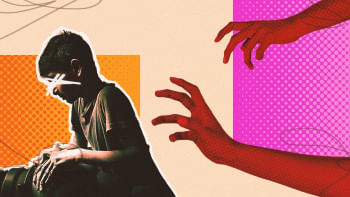An ode to our senior citizens

Six percent of Bangladesh's population is aged 65 years or older. This statistic reveals two things: first, the country has a very young population that is, in many ways, shaping a socio-cultural landscape vastly different from the one I experienced growing up as a millennial. An unprecedented pace of global change, which some call progress and others call a dip into perilous waters, makes predicting what will happen down the line, how communities and families will function, and how we perceive our collective purpose in life a tad bit difficult.
Second, despite the difficulty in predicting the future of humanity, the gradual yet inevitable passing of the current cohort of senior citizens provides some anecdotal evidence from both my personal life and that of my friends. It suggests that we will witness the disappearance of traditional practices that, for better or worse, defined that generation and their sense of being. What makes this shift different from previous ones is how the very idea of families, including who constitutes a family, will be redefined, especially in developing societies such as Bangladesh.
I reside in Canada and belong to a group of fortunate Bangladeshis who reaped the benefits of my grandparents' generation struggling day in and day out not only for themselves but also for us. We moved abroad in pursuit of a stable, safe, and financially independent life. My grandparents carried with them an unwavering sense of public service, dedicating themselves to hard work both at their jobs and at home, organically dividing and sometimes sharing tasks.
After the partition of the subcontinent and the formation of Bangladesh, they believed their primary purpose in life was to create a brighter future filled with innumerable opportunities for the next generations and to give them what they did not have: peace, comfort, and the chance to build a life from a foundational place of financial security and, more importantly, hope. Without oversimplifying, it is safe to say that selflessness represents the core value of our senior citizens.
The truth of the matter is that people like me, spoiled and coddled in comfort, have profited in more ways than one from the journeys of the older generation, which was profoundly shaped by the dark, complex, and challenging period surrounding Bangladesh's birth. Upon reflection, I predict that there are three things we will lose as they leave this world in the coming years.
First, they will take with them the idea of community upliftment, at least in the traditional Bangladeshi sense beyond tokenistic and self-gratifying notions of supporting the community. My grandparents, like most of their peers and irrespective of their financial statuses, believed in sharing whatever resources they could muster to help others. Altruism defined their underlying philosophy. Altruism has never solved big policy problems, but it has played small yet meaningful roles in improving the lives of individuals who, for various reasons, may not have been in a place they deserved to be as human beings.
The notion of community upliftment, whether it involved supporting someone's education from their own pocket or offering a roof over their head without seeking recognition, will fade with the passing of Bangladesh's current cohort of senior citizens. People in my age bracket or younger will not possess that same sense of service to others. We have too many things to worry about in our lives. I hope to be proven wrong. Various factors, including a heightened focus on oneself, responsible financial planning, and individual responsibilities are contributing to this societal shift. Additionally, there are external economic factors that one cannot ignore.
In the future, people will either have to depend on themselves or the government for the kind of ad-hoc emergency support that was once part and parcel of our social psyche. Acts of kindness or unspoken generosity, like giving an old saree or a shirt to a relative who needs a new piece of clothing without boasting about it or sending over a car to someone in need of transportation for the day, will diminish.
Community will exist in name and social status, but we will fall short of practicing the basics of community as our senior citizens so skilfully did: quietly, discreetly, and with a relentless sense of empowering others.
Second, the tradition of large-scale family and community gatherings will shrink. This is a natural consequence of lesser general engagement between people who are not blood relatives. It is usually my grandparents' generation or parents in their 60s or older who make the added effort to gather extended family under one roof a few times a year. In Bangladeshi society, respect is often determined by age—the older you are, the more respect you receive. People visit to show their reverence for elders in the larger family network, and by doing so, keep in touch with cousins and other relatives. However, as the cohort of today's seniors passes away, extended relatives, such as second cousins, will become more distanced from each other.
Third, we will witness the decline, perhaps even the death, of joint families. The idea of grandparents keeping the family together as patriarchs and matriarchs will fade with the demise of today's seniors. Gone will be the childhoods of future generations growing up with many people under a single roof. Running a household with more than 10 people, including grandparents, parents, their children, and support staff, is not feasible in the modern economic climate.
My generation is less well-off than previous generations. The data shows this, attributable to factors such as grotesque levels of inequality and an economy designed to benefit a select few. The tradition of large joint families, whether in a big bungalow or a smaller house where people crowd together to share rooms, will die off first in urban Bangladesh and eventually in rural areas, taking with it a central component of our culture.
The reason for these reflections, and this article writ large, is personal. I lost my grandmother about a month ago, preceded by the loss of my grandfather five years ago. They were noble and honourable socialites. They represented a generation whose overarching purpose in life was to improve the lives of those around them and the generations that followed. They made an added effort to keep familial bonds intact, kept us connected to our roots, and ensured our ancestral village was more than just a footnote in our lives.
As an expat who has had the privilege of having all four grandparents alive into my late 20s, it is undeniably difficult to see the loss of loved ones from so far away. Many of you readers, particularly international students, will be able to relate. Living in the West, I see how society functions here, providing a safer environment and giving more people of all socioeconomic statuses and stripes a fairer shot at building a decent life for themselves. But it would be incomplete not to suggest that things can get lonely.
Health and education systems are naturally better in the West, creating a more optimal environment to start families. In many ways, we are selfish, but we are so with an awareness of the harsher realities of a polarised world where people are refusing to listen to one another, let alone debate. As a result, combined with the slow wilting of an older generation that valued community over self, we are becoming more inward-looking, less reflective, and less generous. To me, this is tragic.
I may be blabbering about my own life here, and my experience or perspective on this issue may be the antithesis of what others are feeling. Maybe that sense of community that has formed the plotline of the Bangladeshi story will prevail. Maybe I am revering a single generation too much, a generation that has its own share of skeletons. That generation was inclusive in the sense that they did not think twice about supporting those who spoke the same language, shared the same faith, and were part of their wider family or community. But what about those who did not?
To generalise and say that they were all selfless is utopian. I have my problems with the older generation, ranging from their views on what a good marriage should be and how women should behave or what their place in society should be, to certain public policies they prioritised. But again, doing so would be generalising as well. So, I take the good things from the package they called life and try to learn the things they got right.
Mir Aftabuddin Ahmed is a public policy columnist and an Urban Fellow Researcher with the City of Toronto. He can be reached at [email protected]
Views expressed in this article are the authors' own.
Follow The Daily Star Opinion on Facebook for the latest opinions, commentaries and analyses by experts and professionals. To contribute your article or letter to The Daily Star Opinion, see our guidelines for submission.

 For all latest news, follow The Daily Star's Google News channel.
For all latest news, follow The Daily Star's Google News channel. 








Comments